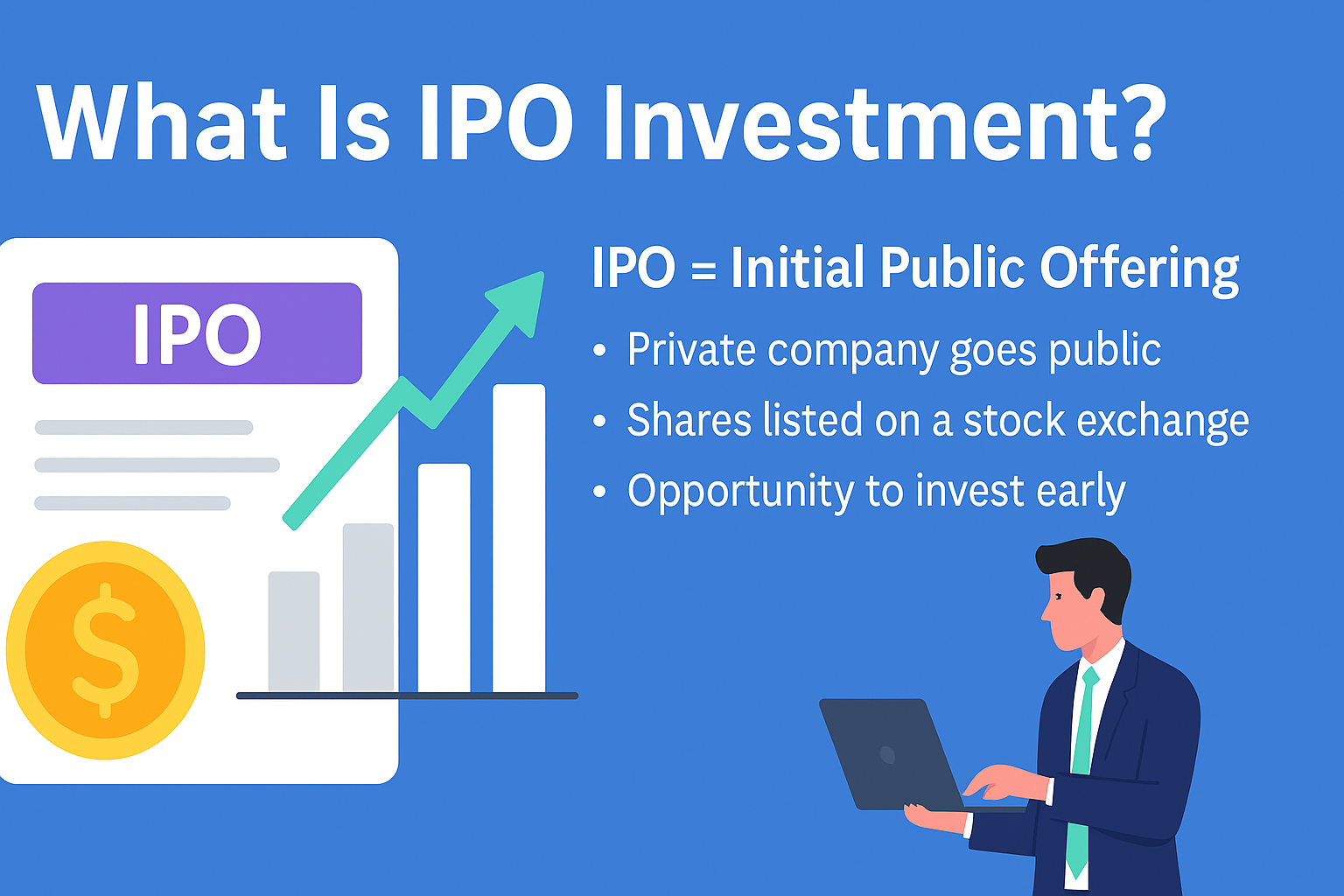
What Is IPO Investment? A Beginner’s Guide to Understanding and Profiting from IPOs
What Is an IPO Investment?
An Initial Public Offering (IPO) refers to the process through which a private company offers its shares to the public for the first time. By doing so, the company becomes publicly traded and its shares are listed on stock exchanges like NSE or BSE in India.
IPO investments allow retail and institutional investors to buy shares in a company before they are available on the open market. It's often viewed as an opportunity to invest in the early stages of a company’s growth journey.
📘 According to Investopedia, IPOs are commonly used by companies to raise capital to fund expansion, pay off debt, or improve public visibility.
How Does an IPO Work?
1. Pre-IPO Stage
A company hires an investment bank or underwriter to evaluate its finances and business plan.
They draft a Draft Red Herring Prospectus (DRHP) and submit it to the Securities and Exchange Board of India (SEBI).
2. SEBI Approval
SEBI reviews and approves the DRHP, ensuring transparency and investor protection.
3. Price Band and Subscription
A price band is set (e.g., ₹100–₹120).
Investors apply within this band.
Based on demand, the final price is determined through book building.
4. Allotment and Listing
Shares are allotted to investors.
The stock gets listed on a stock exchange.
Trading begins on the listing day.
✅ Visit NSE India’s official site for the latest IPO announcements and data.
Why Do Companies Launch IPOs?
| Purpose | Description |
|---|---|
| Raise Capital | To fund expansion, new projects, or reduce debt |
| Public Image | Enhances credibility and visibility |
| Liquidity | Early investors can sell shares |
| Market Valuation | Helps determine company’s market value |
Why Should You Invest in IPOs?
✅ First-Mover Advantage
Buying early in a company’s public journey can offer high growth potential.
✅ Discounted Valuations
Sometimes, IPOs are priced attractively to encourage participation.
✅ Portfolio Diversification
New sectors or emerging companies can balance your investment portfolio.
Risks Associated with IPO Investing
While IPOs can be lucrative, they come with risks:
Overvaluation: IPOs can be priced high based on hype.
Volatility: Prices can fluctuate wildly post-listing.
Unproven Business Models: Some companies lack long-term performance records.
📊 As per Moneycontrol, many recent IPOs have shown mixed results on listing day, highlighting the importance of careful research.
Tips for Investing in IPOs
Read the Prospectus: It outlines company finances, risks, and goals.
Check Promoter Background: Review experience and past ventures.
Avoid Herd Mentality: Don’t invest just because it’s popular.
Review Financials: Compare earnings, margins, and debt ratios.
Consider Grey Market Premium (GMP): While unofficial, GMP can indicate investor sentiment.
IPO vs. Regular Stock Investment
| Feature | IPO Investment | Regular Stock Purchase |
|---|---|---|
| Access | Pre-market | Open market |
| Price Control | Price band set by company | Market-driven |
| Risk | Higher (less history) | Lower (established data) |
| Volatility | High on listing | Moderate to high |
How to Apply for an IPO in India
Open a Demat and Trading Account
Check Upcoming IPOs via NSE or Economic Times
Apply via ASBA (Application Supported by Blocked Amount) through net banking or UPI
Wait for Allotment Confirmation
Check Listing Price on Day of Launch
Conclusion
IPO investment is an exciting and potentially rewarding avenue for investors looking to participate in the growth of promising companies. However, like all investments, it requires research, patience, and an understanding of market dynamics.
Before you invest in any IPO, ask yourself:
Do I understand the business model?
Is the company financially stable?
Am I investing for the short-term listing gain or long-term growth?
With informed decisions and a careful strategy, IPOs can become a valuable part of your investment portfolio.
🧠 For deeper insights, explore Forbes’ IPO guides and expert takes from Wikipedia’s IPO page.
 (1200 x 630 px) (1200 x 630 px) (1200 x 630 px) (1200 x 630 px).jpg)
 (1200 x 630 px) (1200 x 630 px) (1200 x 630 px) (1200 x 630 px).png)
 (1200 x 630 px) (1200 x 630 px) (1200 x 630 px).jpg)